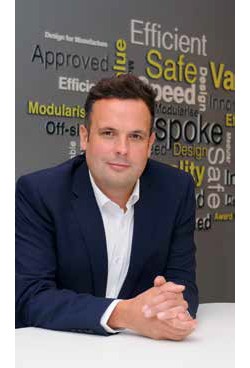The healthcare sector offers huge potential for offsite methods to provide modern, cutting-edge facilities. We spoke to David Hartley, Managing Director of MTX on how they are providing award-winning fast-track healthcare solutions.
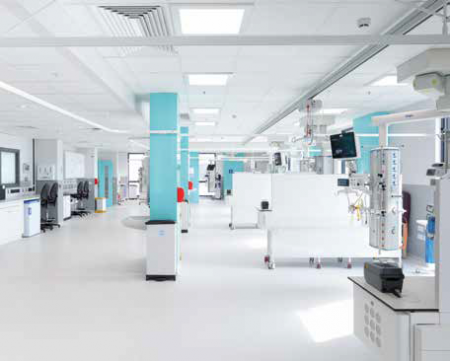
Q: MTX has decades of experience in healthcare facilities. For those unfamiliar with what MTX does, when did you start on the journey with modular manufacture and providing offsite solutions to the sector's needs?
David Hartley (DH): MTX has been doing business for four decades but the company in its current form emerged in 2002, focused on extending, refurbishing and remodelling facilities for hospitals across the UK using traditional building and fit-out techniques. Operating theatres was a big focus for that work, and there was an increasing demand for modular operating theatres. We already had the project management skills and contractor know-how and developed a more flexible approach to modular theatres that was not driven by the demands of a factory. We formed strategic partnerships with specialist steel fabricators who build the structures offsite to our precise specification for transport and assembly on site, quite literally constructing the building around the needs of the healthcare provider for bespoke solutions. Our first modular theatre project in Aberdeen and was a huge success, and we built up the business from there, evolving to take on board the latest developments.
Q: The DfMA concept is central to successful offsite construction – how has MTX embedded this into its manufacturing approach and overall construction design mindset?
DH: We have strategic partnerships with a small number of specialist steel fabricators who build the structures offsite to our precise design and specification for transport and assembly on-site. They manufacture to our highly flexible and adaptable solutions dependent on layout and site configuration. Cladding is manufactured off the critical path to minimise the activity on the busy operational site and we ensure a seamless external finish by installing in situ, in the same way you would on a traditional build. Our projects make extensive use of prefabricated MEP modules from partners who also embrace MMC. Modules incorporate main mechanical services such as LPHW pipework, medical gases, and ductwork delivered to be assembled on-site in line with the Government's Public Sector Playbook. Our unique approach is to 'modularise' the building around architects' and design teams' internal footprints which ensure there is no compromise in our final solution.
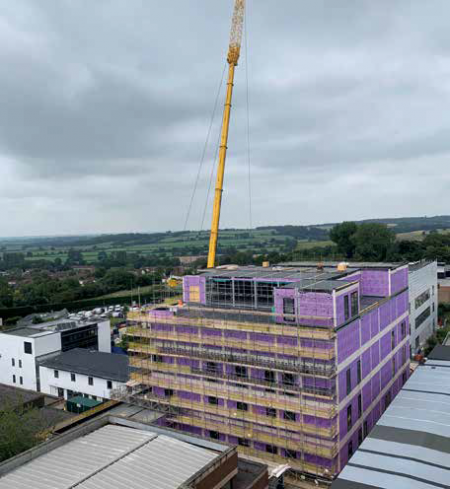
Q: From your experience, is the public sector – certainly healthcare – better at understanding what procuring an offsite solution brings e.g. better quality facilities, quicker and more sustainably, or is there still a knowledge gap?
DH: There is still a knowledge gap and more education is needed. Every business case for investment in new medical facilities has to embrace MMC to succeed. That is the driver to change building techniques and move forward. There is increasing recognition that the new operating theatres, ward accommodation and other facilities we create for health trusts across the UK are delivered more quickly with reduced waste and less disruption than conventional build projects. But offsite sceptics need to understand that there are no cutting corners or compromising quality - because MMC must meet the same standards and is subject to the same building regulations as a conventional build. Our technology represents a high quality and economically viable proposition where our design and project delivery teams meet individual client requirements while ensuring all of the advantages of offsite construction are realised without compromise.
Q: MTX's appointment to the new Crown Commercial Services framework has put the business in a great position and provides opportunities to showcase your modular expertise. Is the appointment more than just ensuring maximum pre-manufactured value?
DH: It is hugely encouraging to see the UK Government driving acceptance of MMC and DfMA through the new CCS framework and the Public Sector Playbook. Offsite construction is a prerequisite in virtually every outline business plan for new development on hospital sites, and quite frankly if it is not in that plan, then the development is unlikely to happen. That commitment to offsite construction not only makes sense in terms of build efficiency and economy, but it also builds confidence in the process as people are forced to consider it as a viable alternative to traditional construction methods. Our appointment to the framework is another step in legitimising offsite construction and MMC for those who doubt its value, and it also reinforces our position as an approved provider of new facilities for the NHS.
Q: The award-winning project for the Oxford Critical Care facility grabbed a lot of headlines – what were the key take-away learning points from this for MTX?
DH: The Oxford project clearly demonstrated that early engagement is vital and the importance of having a good working relationship with a very proactive partner. It also showed that our implementation of MMC and DfMA can be flexible and nimble – because the design changed substantially during build process to accommodate the Oxford University Hospitals NHS Foundation Trust's requirements. The Oxford Critical Care unit employed a 'hybrid' MMC construction method and rapid design and planning process. The five-storey structure used 148 offsite-manufactured steel structural units craned into position floor by floor, before fit-out on site with concrete flooring, offsite manufactured walling units and glazing, and extensive modularised M&E services. MTX added critical value to the initial concept by linking to the adjacent and recently refurbished Trauma building on four of the five levels to deliver fire safety and evacuation standards that enabled both the new building and the Trauma centre to meet modern benchmarks.
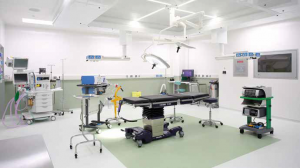
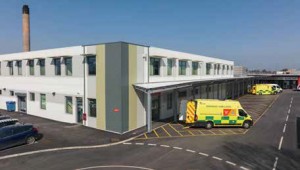
Q: MTX is active in several other sectors including education – how easy is it to reconfigure/transfer the prefabrication process from cleanroom to classroom for example?
DH: We are a specialist supplier to the healthcare sector for on-site hospital facilities such as operating theatres and ICUs and scanning facilities, and also the new Community Diagnostic Units. We provide very high-performance buildings for the healthcare market that are designed to meet the requirements of hospitals and health trusts – such as concrete structural floors constructed to meet the necessary response factors of operating theatres, or ultra-clean air handling systems. The level of sophistication and advanced specification that goes into these structures is not suitable for classrooms and is far more advanced than the normal requirements for a building to be used in a school or college location. MTX is, of course, capable of creating classrooms and has done so in the past, but currently our primary focus is on healthcare and meeting the specific requirements of that market.
Q: The use of technology and digital tools within factory environments is critical to offsite manufacture with toolkits, platform approaches and repeatable components – how is MTX embracing the 'Industry 4.0/Smart Factory approach?
DH: We work with key partners who embrace those principles and are driven by continuous improvement both within MTX and through our construction partners. We have evolved to optimise our processes – and constantly review those processes to do things better. Manufacturingand tooling techniques continue to improve, and we work with our partners to ensure they upskill and that MTX stays at the forefront of the MMC and DfMA revolution. Not having our own factory has proved to be an advantage. Modular building providers are often factory-led and sell a 'product line', but our business model has enabled us to be much more flexible in the solutions we provide. MTX is a main contractor with core engineering design and project managing skills and we pull in the resources we need for our turnkey solutions. By partnering with advanced manufacturers, we can provide our clients with optimised programmes and proven best value.
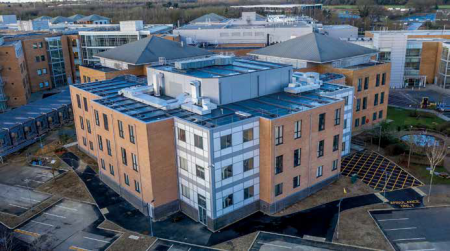
Q: How do you see the offsite and volumetric modular sector developing over the next 18 months and what ideally do you want to see from an MTX perspective?
DH: MMC and offsite construction will be more widely used and MTX wants more health trusts to embrace the concept as they strive to implement the Government's ambitious plans to build 40 new hospitals by 2030. That objective cannot be achieved without employing the principles of MMC and DfMA. It is generally accepted that the plans for new UK hospitals will also include substantial upgrades and refurbishments to existing NHS estates. Brand new hospital developments on greenfield sites will continue to use offsite construction, but MMC is particularly important for creating new facilities within existing hospital sites where limited space and the need to reduce on-site disruption are vital elements. The new operating theatres, ward accommodation and other facilities we are creating for health trusts across the UK are delivered more quickly with reduced waste and less disruption than conventional build projects, and that is exactly what health trusts require.
For more information visit: www.mtxcontracts.co.uk
Images: 01. David Hartley, Managing Director, MTX 02-03. John Radcliffe Hospital, Oxford 04. Operating theatres can be delivered quickly and to exceptional standards using offsite methods. Kent & Canterbury Hospital 05. Leighton Hospital extension, Crewe 06. Norfolk & Norwich University Hospital

